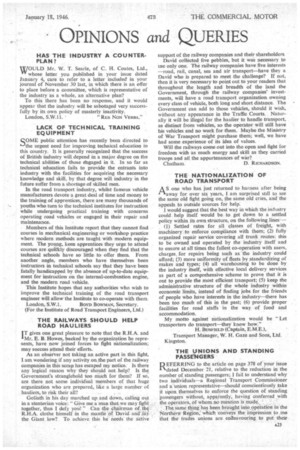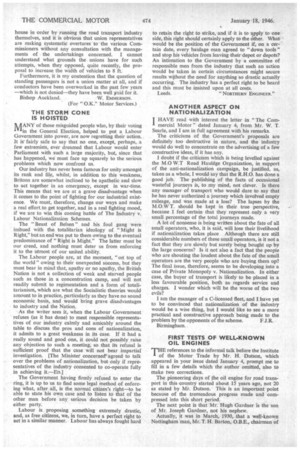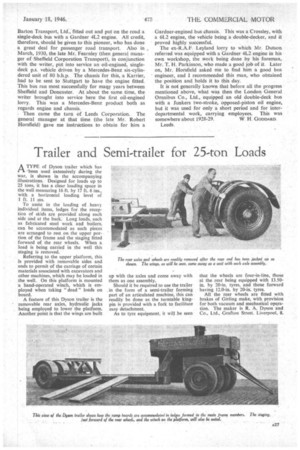OPINIONS and QUERIES HAS THE INDUSTRY A COUNTERPLAN?
Page 35

Page 36

Page 37

If you've noticed an error in this article please click here to report it so we can fix it.
WOULD Mr. W. T. Searle, of C. H. Coates, Ltd., " whose letter you published in your issue dated January 4, care to refer to a letter included in your journal of November 30 last, in which there is an offer to place before a committee, which is representative of the industry as a whole, an alternative plan?
To this there has been no response, and it would appear that the industry will be sabotaged very successfully by its own policy of masterly inactivity.
London, S.W.11. " RES NON VERBA."
LACK OF TECHNICAL TRAINING EQUIPMENT SOME public attention has recently been directed to the urgent need for improving technical education in this country. It is generally recognized that the success of British industry will depend in a major degree on the technical abilities of those engaged in it. In so far as technical education fails to provide the entrants into industry with the facilities for acquiring the necessary knowledge and skill, by that degree will industry in the future suffer from a shortage of skilled men.
In the road transport industry, whilst famous vehicle manufacturers devote a great deal of time and money to the training of apprentices, there are many thousands of youths who turn to the technical institutes for instruction while undergoing practical training with concerns operating road vehicles or engaged in their repair and maintenance.
Members of this Institute report that they cannot find courses in mechanical engineering or workshop practice where modern methods are taught with modern equipment. The young, keen apprentices they urge to attend courses are quickly discouraged when they find that the technical schools have so little to oiler them. From another angle, members who have themselves been instructors in technical schools say that they have been fatally handicapped by the absence of up-to-date equipment for instruction on the internal-combustion engine, and the modern road vehicle.
This Institute hopes that any authorities who wish to improve the technical training of the road transport engineer will allow the Institute to co-operate with them.
London, S.W.1. BOYD BOWMAN, Secretary. (For the Institute of Road Transport Engineers, Ltd.) THE RAILWAYS SHOULD HELP ROAD HAULIERS IT gives one great pleasure to note that the R.H.A. and IMr. E. B. Howes, backed by the organization he represents, have now joined forces to fight nationalization; may success attend their efforts.
As an observer not taking an active part in this fight, 1 am wondering if any activity on the part of the railway companies in this scrap has escaped my notice. Is there any logical reason why they should not help? Is the Government's stranglehold too much for them? If so, are there not some individual members of that huge organization who are prepared, like a large number of hauliers, to risk their all?
Goliath in his day marched up and down, calling out in. a stentorian voice: "Give me a man that we may fight together, thus I defy you! " Can the chairman of the. R.H.A. clothe himself in the mantle of David and 'Jai, the Giant low? To achieve this he needs the active support of the railway companies and their shareholders.
David collected five pebbles, but it was necessary to use only one. The railway companies have five interests —road, rail, canal, sea and air transport—have they a David who is prepared to meet the challenge? If not, then it is very necessary to point out to your readers that throughout the length and breadth of the land the Government, through the railway companies' investments, will have a road transport organization owning every class of vehicle, both long and short distance. The Government can add to those vehicles, should it wish, without any appearance in the Traffic Courts. Naturally it will be illegal for the haulier to handle transport, as distinct from vehicles, so the operator will still have his vehicles and no work for them. Maybe the Ministry of War Transport might purchase them; well, we have had some experience of its idea of values.
Will the railways come out into the open and fight for freedom with as much energy and skill as they carried troops and all the appurtenances of war?
Chatham. D. RICHARDSON.
THE • NATIONALIZATION OF ROAD TRANSPORT A S one who has just returned to harness after being 1-laway for over six years, I am surprised still to see the same old fight going on, the same old cries, and the appeals to outside sources for help.
I would suggest that the best way in which the industry could help itself would be to get down to a settled policy within its own structure, on the following lines — (1) Settled rates for all classes of freight, with machinery to enforce compliance with them; (2) fully organized repair service covering all trunk routes: this to be owned and operated by the industry itself and to ensure at all times the fullest co-operation with users, charges for repairs being such as the industry could afford; (3) more uniformity of fleets by standardizing of makes and types; (4) all warehousing to be done by the industry itself, with effective local delivery services as part of a comprehensive scheme to prove that it is out to provide the most efficient transport; (5) keep the administrative structure of the whole industry within economic limits, instead of finding jobs for the friends of people who have interests in the industry—there has been too much of this in the past; (6) provide proper facilities for road staffs in the way of food and accommodation.
My motto against nationalization would be "Let transporters do transport—they know how."
H. BOSFIELD (Captain, E.M.E.), Transport Manager, W. H. Gaze and Sons, Ltd. Kingston.
THE UNIONS AND STANDING PASSENGERS p EFERR1NG to the article on page 378 of your issue tdatecl December 21, relative to the reduction in the number of standing passengers; I fail to understand why two individuals—a Regional Transport Commissioner and a union representative—should conscientiously take it upon. themselves to enforce the question of standing 'passengers without, apparently, having conferred with the operators, of whom no mention is made.
. The same thing has been brought into .operation in the Northern Region, which conveys the impression to me that the trades unions are endeavouring to put their house in order by running the road transport industry themselves, and it is obvious that union representatives are making systematic overtures to the various Commissioners without any consultation with the managements of the undertakings concerned. I cannot understand what grounds the unions have for such attempts, when they opposed, quite recently, the proposal to increase the width of vehicles to 8 ft.
Furthermore, it is my contention that the question of standing passengers is not a union matter at all, and if conductors have been overworked in the past few years —which is not denied—they have been well paid for it.
Bishop Auckland. W. EMMERSON.
(For " O.K." Motor Services.) THE STORM CONE IS HOISTED
MANY of those misguided people who, by their voting in the General Election, helped to put a Labour Government into power, are now regretting their action. It is' fairly safe to say that no one, except, perhaps, a few extremists, ever dreamed that Labour would enter Parliament with such a large majority, but, since that has happened, wa must face up squarely to the serious problems which now confront us.
Our industry has never been famous for unity amongst its rank and file, whilst, in addition to this weakness, Britons are somewhat inclined to be apathetic and slow to act together in an emergency, except in war-time. This means that we are at a grave disadvantage when it comes to the point of fighting for our industrial existence. We must, therefore, change our ways and make a real eifort.to get together, and in a real fighting mood, if we are to win this coming battle of The Industry v. Labour Nationalization Schemes.
The "Beast of Belsen " and his foul gang were imbued with the totalitarian ideology of "Might is Right," but an end was put to them owing to the eventual predominance of "Right is Might." The latter must be our creed, and nothing must deter us from enforcing it to the utmost of our united ability.
The Labour people are, at the moment, "on top of the world" owing to their unexpected success, but they must bear in mind that, apathy or no apathy, the British Nation is not a collection of weak and starved people such as those in a concentration camp, and will not readily submit to regimentation and a form of totalitarianism, which are what the Socialistic theories would amount to in practice, particularly as they have no sound economic basis, and would bring grave disadvantages to industry and the Nation.
As the writer sees it, when the Labour Government refuses (as it has done) to meet responsible representatives of our industry calmly and amicably around the table to discuss the pros and cons of nationalization, it admits to a great weakness in its case. If it had a really sound and good one, it could not possibly raise any objection to such a meeting, so that its refusal is sufficient proof that the case will not bear impartial investigation. [The Minister concerned agreed to talk over the problems of nationalization, but only if representatives of the industry consented to co-operate fully in achieving it.—ED.] The Government having firmly refused to enter the ring, it is up to us to find some legal method of enforcing what, after all, is the normal citizen's right—to be able to state his own case and to listen to that of the other man before any serious decision be taken by either party.
Labour is proposing something extremely drastic, and, as free citizens, we, in turn, have a perfect right to act in a similar manner. Labour has always fought hard to retain the right to strike, and if it is to apply to one side, this right should certainty apply to the other. What would be the position of the Government if, on a certaM date, every haulage man agreed to "down tools" and stop his vehicles from leaving their depot or depots? An intimation to the Government by a committee of responsible men from the industry that such an action would be taken in certain circumstances might secure results wi,thout the need for anything so drastic actually occurring. The industry has a perfect right to be heard and this must be insisted upon at all costs.
Leeds. "NORTHERN ENGINEER."
ANOTHER ASPECT ON NATIONALIZATION
IHAVE read with interest the letter in "The Commercial Motor" dated January 4, from Mr. W. T. Searle, and I am in full agreement with his remarks.
The criticisms of the Government's proposals are definitely too destructive in nature, and the industry would do well to concentrate on the advertising of a few constructive ideas, if it has any.
I doubt if the criticism which is being levelled against the M.0 W.T Road Haulage Organization, in support of the anti-nationalization campaign, be justified, as, taken as a whole, I would say that the R.H.O. has done a good job. The publishing of the facts of occasional wasteful journeys is, to my mind, not clever. Is there any manager of transport who would dare to say that he has never authorized a journey which involved empty mileage, and was made at a loss? The lapses by the M.O.W T. should be kept in their true perspective, because I feel certain that they represent only a very small percentage of the total journeys made.
A lot of nonsense is being written about the fate of all small operators, who, it is said, will lose their livelihood if nationalization takes place Although there are still considerable numbers of these small operators, is it not a fact that they are slowly but surely being bought up by the large concerns? Is it not also a fact that the people who are shouting the loudest about the fate of the small operators are the very people who are buying them up? The final issue, therefore, seems to be developing into a case of Private Monopoly v. Nationalization_ In either case, the buyer of transport is likely to be placed in a less favourable position, both as regards service and charges. I wonder which will be the worse of the two evils?
I am the. manager of a C-licensed fleet, and I have yet to be convinced that nationalization of the industry would be a wise thing, but I would like to see a more practical and constructive approach being made to the problem by the opponents of the scheme. F.J.R. Birmingham..
FIRST TESTS OF WELL-KNOWN OIL ENGINES E references to the informal talk before the Institute of the Motor Trade by Mr. H. Dutson, which appeared in your issue dated January 4, prompt me to fill in a few details which the author omitted, also to make two corrections.
The pioneering days of the oil engine for road transport in this country started about 15 years ago, not 20 as stated by Mr. Dutson. This is an important point because of the tremendous progress made and compressed into this short period.
The next point is that Mr. Hugh Gardner is the son of Mr. Joseph Gardner, not his nephew.
Actually, it was in March, 1930, that a well-known Nottingham man, Mr. T. H. Barton, 0.B.E., chairman of Barton Transport, Ltd., fitted out and put on the road a single-deck bus with a Gardner 4L2 engine. All credit, therefore, should be given to this pioneer, who has done a great deal for passenger road transport. Also in March, 1930, the late Mr. Fearnley (then general manager of Sheffield Corporation Transport), in conjunction with the writer, put into service an oil-engined, singledeck p.s. vehicle driven by a Mercedes-Benz six-cylindered unit of 80 b.h.p. The chassis for this, a Karrier, had to be sent to Stuttgart to have the engine fitted. This bus ran most successfully for maw/ years between Sheffield and Doncaster. At about the same time, the writer brought into service here the first oil-engined lorry. This was a Mercedes-Benz product both as regards engine and chassis.
Then came the turn of Leeds Corporation. The general manager at that time (the late Mr. Robert Horsfield) gave me instructions to obtain for him a Gardner-engined bus chassis. This was a Crossley, with a 6L2 engine, the vehicle being a double-decker, and it proved highly successful.
The ex-R.A.F. Leyland lorry to which Mr. Dutson referred was equipped with a Gardner 4L2 engine in his own workshop, the work being done by his foreman, Mr. T. H. Parkinson, who made a good job of it. Later on, Mr. Horsfield asked me to find him a good bus engineer, and I recommended this man, who obtained the position and holds it to this day.
It is not generally known that before all the progress mentioned above, what was then the London General Omnibus Co., Ltd., equipped an old double-deck bus with a Junkers two-stroke, opposed-piston oil engine, but it was used for only a short period and for interdepartmental work, carrying employees. This was
somewhere about 1928-29. W. H. GODDARD. Leeds.




























































